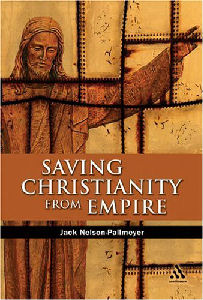
|
Posted July 3, 2005
Book: Saving Christianity from Empire Author: Jack Nelson-Pallmeyer Continuum, NY, pp. 184 An Excerpt from the Jacket:
Saving Christianity from Empire examines four central themes. First, the book describes the nuts and bolts of present U.S. foreign policy, including the philosophical foundations and practical policy options used to justify and pursue empire. Second, the author asserts that empire distorts Christianity, especially in the U.S. context – one in which many Christians passively or actively support U.S. global domination through the exercise of unilateral military power, in opposition to the radical nonviolence of Jesus. In the U.S. imperial context, some combination of fear, patriotism, propaganda, and distorted theology results in broad-based support among Christians for policies that are dramatically opposed to authentic Christianity rooted in the life and faith of Jesus. In short, this theme addresses how the U.S. Empire subverts and distorts Christianity. Third, Saving Christianity from Empire describes empire as a key biblical theme. It explores three conflicting biblical streams, one that embraces or aspires to empire, one that portrays opposition to empire as essential to authentic faith, and another that explains imperial domination of Israel-Palestine as deserved punishment for sin. Finally, it explores the radical nonviolence of Jesus, the nuts and bolts of nonviolent power and nonviolent social change theory and practice, and the practical challenges to Christians living in an imperial nation now understood by many people throughout the world to be the gravest threat to world peace. An Excerpt from the Book: Jesus compares the reign of God to a mustard seed (Mark 4:30-32). The Mustard seed as metaphor flies in the face of theological, historical, and mythological expectations of salvation or historical vindication through God’s violence. It clashes sharply with Isaiah’s imperial promises and with conventional wisdom that said the arrival of God’s realm would be dramatic, even cataclysmic. “For Jesus, God’s domain was a modest affair, not a new world empire,” comments Jesus Seminar. “It was pervasive but unrecognized, rather than noisy and arresting.” We often miss another radical aspect of the mustard-seed metaphor as described by Crossan: The mustard plant is dangerous even when domesticated in the garden, and is deadly when growing wild in the grain fields. . .The point, in other words, is not just that the mustard plants starts as a proverbially small seed and grows into a shrub. . .It is that it tends to take over where it is not wanted . . . And that, said Jesus, was what the Kingdom was like. Like a pungent shrub with dangerous take-over properties. Jesus suggests that people of faith are to be communities of subversive weeds that subvert the goals of those who plant imperial gardens. . . . . The choices before us are clear. As citizens we must choose republic over empire and as Christians we need to embrace “mustard see” varieties of Christian faith while working to challenge imperial theocratic Christianities that threaten the republic. I close with words of hope, words about hope, from Barbara Kingsolver’s novel, Animal Dreams in which Hallie is writing from Nicaragua to her sister Codi in the United States. Wars and elections are both too big and too small to matter in the long run. The daily work – that goes on, it adds up. It goes into the ground, into crops, into children’s bellies and their bright eyes. Good things don’t get lost. Codi, here’s what I’ve decided: the very least you can do in your life is to figure out what you hope for. And the most you can do is live inside that hope . . .What I want is so simple I almost can’t say it: elementary kindness. Enough to eat, enough to go around. The possibility that kids might one day grow up to be neither the destroyers nor the destroyed . . .Right now I’m living in that hope . . . Table of Contents: 1. Will to power 2. Under the cover of terror 3. Plans for empire 4. Empire without exception 5. Continuity of Empire 6. Biblical perspectives on violence and empire 7. Christianity in service to empire 8. Alternatives to violence 9. Choices |
|
